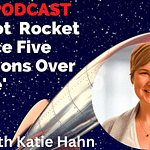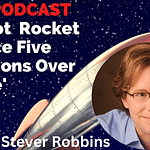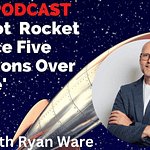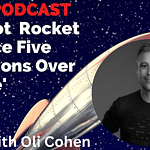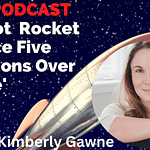Who is Suzanne?
Suzanne Jabour is a grief integration specialist who helps organizations create supportive cultures around emotions, particularly grief. She believes that grief is not something we can ignore or suppress, but something that needs to be integrated into our lives. Suzanne works with companies to address their culture around emotion and protocols for supporting grieving employees. She provides a menu of support options to choose from and encourages conversations about grief. By doing so, she helps create a culture of support and wholeness in the workplace, which not only benefits grieving employees but also improves customer service. Suzanne's ultimate goal is to help individuals integrate their grief, so it becomes a part of them and their lives moving forward.
Key Takeaways
Addressing Grief in the Workplace: "We want to integrate our grief. It becomes a part of us and a part of our life as we carry forward...None of that really works with grief...One to three days is nowhere near as long as it takes. It doesn't even take that year that sometimes we're given grace through. It takes much longer than that for many of us, especially if you've had a really catastrophic loss." - This quote emphasizes the importance of understanding that grief cannot be compartmentalized and ignored, and that it takes much longer than a few days or even a year to process. It also highlights the need for workplaces to have protocols in place to support employees going through grief, as well as a culture that embraces emotions and offers support without the burden falling solely on the grieving person to ask for help.
— Suzanne Jabour [00:02:07 → 00:08:46]
Grieving in the Workplace: "We need some scaffolding to be able to be successful at work."
— Suzanne Jabour [00:09:27 → 00:11:21]
Supporting Your Team Through Grief: "We're all experiencing grief and let's brainstorm. Let's talk about some of the ways we could support each other when we're having those difficult moments or those difficult days."
— Suzanne Jabour [00:11:21 → 00:12:23]
Supporting Grieving Employees: "I'm all about it, own it. Go to them and say, oh my gosh, I listened to this podcast and I realized I totally didn't support you the way you needed. What can we do now? What support do you need now? Right? There's always time to say, oh my gosh, I didn't know any better."
— Suzanne Jabour [00:13:46 → 00:15:25]
Grief at Work: "The biggest thing for business owners, I think, that impacts people at work, is the brain fog."
— Suzanne Jabour [00:17:02 → 00:18:29]
Grief Resources: "One of the people's work that helped me really get through those early, early days is Megan Devine, and her book is It's Okay That You're Not okay."
— Suzanne Jabour [00:19:00 → 00:21:07]
The Importance of Grief in the Workplace: "So it matters because grief gives us an in to talk about some really complicated things that are actually really important for all of us."
— Suzanne Jabour [00:21:55 → 00:24:19]
Valuable Free Resource or Action
https://static1.squarespace.com/static/6013019a02a2d7779026a55e/t/64092e6c2df4700a16d5dadd/1678323312188/e+book+final%3F.pdf
_________________________________________________________________________________________________
Subscribe to our newsletter and get details of when we are doing these interviews live at https://link.thecompleteapproach.co.uk/newsletter
Find out more about being a guest at : https://link.thecompleteapproach.co.uk/beaguest
Subscribe to the podcast at https://link.thecompleteapproach.co.uk/podcast
Help us get this podcast in front of as many people as possible. Leave a nice five-star review at apple podcasts : https://link.thecompleteapproach.co.uk/apple-podcasts and on YouTube : https://link.thecompleteapproach.co.uk/Itsnotrocketscienceatyt!
Here's how you can bring your business to THE next level:
If you are a business owner currently turning over £/$10K - £/$50K per month and want to grow to £/$100K - £/$500k per month download my free resource on everything you need to grow your business on a single page : https://scientificvaluebuildingmachine.online
It's a detailed breakdown of how you can grow your business to 7-figures in a smart and sustainable way
————————————————————————————————————————————-
Transcript
Note, this was transcribed using a transcription software and may not reflect the exact words used in the podcast)
SUMMARY KEYWORDS
grief, Grief at Work, ebook, brain fog, practical support, program, business owners, Suzanne Jabor, grief education, lack of support, long-term support, consult, newsletter, processing grief, vulnerability, emotions at work, team members, loyalty, bereavement leave policies, culture, menu of support options, disengaged employees, anticipatory grieving, team-building, business leaders, follow-up, cycles, returning to normality, nonfiction comprehension, Facebook, Instagram, Megan Devine, David Kessler, post traumatic growth, meaning in grief.
SPEAKERS
Suzanne Jabour, Stuart Webb
Stuart Webb [00:00:22]:
Hi, and welcome back to It's Not Rocket Science five Questions Over Coffee. I'm really delighted to be welcoming Suzanne Jabor today from a lived experience. Now, Suzanne is somebody who's passionate about helping people to understand and overcome grief, and she's a grief education. I think it's going to be a really fascinating discussion because it's something that we so rarely deal with, and as business owners, it is the thing that we need to deal with, because if it's not somebody within our organization, it could well be us that's having to go through something like this. And we just often want to put this away in a shed and hope that it just goes away. And that's not really the right way of dealing with some of these feelings. It really doesn't help the organization. It doesn't help you. So I think it's going to be a really fascinating discussion that Suzanne really want to welcome you to it's Not Rocket Science five Questions of Copy. And thank you for spending the time with us.
Suzanne Jabour [00:01:17]:
Thank you so much for having me. I really appreciate, especially people whose work is focused on business, taking the time to talk about this topic because it's so important, it has such a huge impact.
Stuart Webb [00:01:27]:
Yeah. Well, I will tell you that when my father died, it was a problem for my business for a short while until I eventually learned to overcome it. So I know how it can affect people who are trying to run businesses, who are also trying to, as I said, compartmentalize this thing and just ignore it and hope it just goes away, which is just if that's happening within your organization, it's happening with one of your employees. It's the wrong way of dealing with it. So, Suzanne, you've seen this. You've helped people talk to us about the sort of things that people are doing and how you're trying to help them, to educate them on their grief and the way to deal with it.
Suzanne Jabour [00:02:07]:
Yeah. So the thing that's the most important for me is exactly what you're talking about. This kind of whole idea we have that we can put grief in a box, we can just kind of ignore it, we can pretend it's not there and it will eventually go away, is unfortunately not how it works. Really the only way to get to I talk about integration being the goal. We want to integrate our grief. It becomes a part of us and a part of our life as we carry forward, which is, I'm sure, what you've done with your dad, right? You haven't left him behind. You haven't moved on or gotten through anything. You've learned how to live with the loss, to carry that grief with you and carry him with you. And what happens at work often is work many places is a place where we're not encouraged, really, to have emotions anyway. Employers want us to kind of show up and get the job done and figure out what the problem is, make a plan, solve the problem, move forward. None of that really works with grief. And so if that's your office culture, it can be really challenging for grievers. And if your office culture is more accepting of emotions than that, even then the really big emotions that happen in grief, which are mostly, to be honest, the ones on that negative or bad side of the list if you think about that weird paradigm we have of positive and good emotions and negative and bad emotions? The ones that we've been taught from our childhoods for most of us to ignore and not express and tamp down are the ones that are coming at you in a tsunami when you're in early, especially those early days and those acute days of grief. And for most places, certainly in North America, and I'd love to hear about what it's like for you in the UK. There's kind of a standard one to three days off, and then you're expected to just show up and be your normal self and get your job done. And one to three days is nowhere near as long as it takes. It doesn't even take that year that sometimes we're given grace through. It takes much longer than that for many of us, especially if you've had a really catastrophic loss. And so that sort of sense that you should be able to show up and do your job really does a disservice to everyone because you're then as the griever, feeling all these expectations that you can't meet, which is then more grief and loss, right? Because you're already mourning the person you lost. And then if it's someone who the loss of them changed your identity, which is what happened to me, you're mourning yourself, your loss of yourself, and now you're mourning that you don't have these capacities at work that you used to have, but you're supposed like, it just gets so complicated. So if instead we can have talked about it ahead of time, we can have protocols, we can have developed the skills and mindsets that allow us to at least witness all of those emotions that are coming up and at least have an open forum where people could talk about them, maybe a quiet place where they could go when they feel overwhelmed. Preferably not the bathroom, right? There's many of us that have cried massive tears in a bathroom stall. It's not all that dignified, right, somewhere quiet to go when you're an overwhelmed. That's not the bathroom. I love to think about it as like a menu of things you could choose from that you might need support with, and we can talk about details of that if that's interesting. But what I do with companies is just come in and look at what the culture is around emotion because that's where we need to start. And I know that's scary and I know we don't really want to, but it makes us better humans. It makes us better business leaders. It makes us better employers and customer service providers. And then once we've got to that point where we can maybe have a conversation about grief without feeling like we're terrified and we want to turn and run away, then we can look at what are the practical things we can do. A lot of companies come to me because they have someone who's important to their team who's had a significant loss and they realize they want to do something more than like the referral to the Employee assistance program, right, that referral to sort of the three free counseling sessions. They know that's not going to be enough, but they don't know what else to do. So that's where I can step in and really go, okay, great, let's look at your culture. Let's look at this. If it's based on an individual, let's start there and then from there we can make some really robust protocols that people know they can hook into. So the other thing that happens that's really hard for grievers is if there's no conversation that's ever been had in your workplace, there's no protocols in place. You're having to go in the hardest moments of your life to try and advocate for what you need. And that's really a big burden for people. So they tend to not do it because they're in full on survival mode. They can't also go and say they can't even necessarily identify what's happening to them. So they can't go and say, well, I'm really having significant brain fog and I'm struggling with keeping track of my calendar. Could we set up a shared calendar? Like they can't even articulate any of that because they're in survival mode. But if you as the boss, the supervisor, the business owner could say, hey, I know you're grieving. Here's our grief protocol. What of those things would really help you this week? Let's put those into place. And it's an offer that's made as opposed to someone coming to have to ask. That's really powerful. And the ripple of that is that it shows all your other employees who aren't grieving that you care about them, that their whole self is welcome at the office. And if they're struggling with a loss, big or small or just struggling with something else, they know there's an ability to come and get support. So it creates that whole culture of support and wholeness that I really think is a big part of that sort of quiet quitting epidemic and people showing up and just being barely engaged. If people feel seen and heard, then we also want to show up in a really robust way as best as our capacities are that day. And we know the vast majority of people are doing the best they can in any given day with the skills and capacities they have. So if we're working from that assumption, then we can really make real shifts around how we support both our staff and we have customers who are grieving too. So if you have customer facing folks, if that's your business, even if it's business to business, the way that you interact with people who have experienced a loss I just was talking with a friend the other day who'd experienced a significant loss. And honestly, we're all sharing notes. So I know which companies I will not go to because they didn't have capacity to help him when he needed it, and I know which ones I will. So if you think that grief is not impacting your business, I'm here to tell you you are wrong. Because especially right now, coming out of the last three years, we've all experienced we all have grief for something. Whether we've lost people or multiple people or all the other things we lost, we all have it. So we need to be talking about it.
Stuart Webb [00:08:46]:
Suzanne, it's really interesting, and it's exciting to hear you say, I guess the question that follows on from that we could turn this into 200 questions of a coffee. We're not going to. I could probably but we were so you mentioned it at the end there. What are the things that people are doing wrong? Because you've already sort of said there are things that people are trying to do to sort of overcome this. And it's often a business owner sort of doing something and you think that they have just missed the point, or they've just misunderstood, or they're trying valiantly to do something, but it's misguided. What are some of the things you've seen that have sort of made you stop and go, no, I really think you need to stop and turn around and go somewhere else?
Suzanne Jabour [00:09:27]:
Yeah, I mean, I think the biggest one that I hear from grievers is that there's just no support at all. So they get the sort of I'm sorry, they might get sent flowers, maybe not. They might get a card, maybe not. All of those things are great, and we need support. Beyond that, we need practical support. We need some scaffolding to be able to be successful at work. So that's the biggest one, right? Is that the same fear that we feel in our real lives when we're faced with someone who's grieving and we don't know what to do, we don't know what to say, we don't know how to respond? That happens in the workplace. So that's one end of the scale. One end of the scale is they get no support at all. That's a big problem. The other end of the scale is they get support, but it's not what they need. So it's not kind of griever centered. It's happened without a conversation. Perhaps someone has said, oh, you must be overwhelmed, so let's take this task from you. Well, if you're taking the task that they really like, then now they're left with, not the things that they really enjoy at work or the companies that are trying that want to help and want to give support that offer, and they take things away, or they provide scaffolding. There's no follow up plan put in place. So I actually was talking with one woman who ended up quitting her job and going somewhere else because she had lost a child, so she'd lost a son. And they provided all kinds of support, really robust support at the beginning, but no follow up plan to then take that scaffolding down so she could step back into the fullness of her role. So she ended up leaving because she became that woman who'd lost a child who everyone had to help, and she didn't want that to be her identity either. Right. So it's kind of like, from both ends of the spectrum, we kind of go wrong. And really the key, key thing, if you can hear anything, is do it all in consultation with the griever. Yeah.
Stuart Webb [00:11:21]:
Brilliant.
Suzanne Jabour [00:11:21]:
And understand that they may not have the capacity, especially in those really acute early days, to articulate or even comprehend what they need. So that's why if you've talked about it ahead of time, I mean, think about what a powerful team building exercise that would be if you had a team meeting where the conversation was, we're all experiencing grief and let's brainstorm. Let's talk about some of the ways we could support each other when we're having those difficult moments or those difficult days. And if you don't have the skills to do that, then you can bring in someone like me who can easily facilitate that conversation and just get the ball rolling. Right. Because then we're sending all kinds of messages. Like, it's also, as we know, as business leaders, right. It's not just about what you say. It's about the messages you're sending. It's about that idea that we value your whole person and your whole experience. Whatever's going on for you is, okay, you're a valued part of this business, and we need you, and we need you at the best of your capacity, whatever that is. Right. So there's kind of, you know, there's pitfalls both ends of the scale.
Stuart Webb [00:12:23]:
Yeah. You said something really valuable there that I think which is doing these things in advance, isn't it? Because doing it too late and having that conversation before I think it's absolutely brilliant that you stress that, because I think that is one of the things that I think, once again, I don't want to get into too. Much personal stuff. But there was a situation with me where somebody who was in the process of they had a terminal condition and they were starting the grieving process before the grieving before the person has left. And essentially, I sort of eventually realized this person was grieving the healthy situation. They were sort of anticipating and sitting, going, well, the healthy what I had before has gone and everything was rosy. Now I know it's not going to be rosy. And they were grieving that, and then there was going to be a second grief after the death. And so it was one of those, this is going to be a long term thing. And the follow up has to be very critical because they will go through several cycles of feeling good and feeling bad and things will change and then it becomes, well, how much longer do we do this and what do we do in order to sort of return to normality? Which is the critical step on that path, isn't it?
Suzanne Jabour [00:13:46]:
Yeah, absolutely. And that can take a really long time. Like for me, I came to this work after the death of my son, which now is two and a half years ago, which is not all that long in the grand scheme of things, but in our sense of how grief works. I should be back to normal, right? I should be totally fine. Well, of course that's not the case. I still have capacities that I go, wait, I used to be able to do that and I can't. So that's okay. I can do lots of other things, but that sort of sense of and in a situation you describe where it's complicated, right? You're having to support someone through anticipatory grief, and then they're going to have the grief when the person finally dies. That person is going to need support for a long time. And you don't want to lose them, right. They're a valued part of your team. So you want to do what you can. And I just want to riff off to something. You were saying that there's a point where it's kind of too late. I don't actually think that's true. I think you can do a lot of really good mitigating of what you might not have done brilliantly, because we all are doing the best we can as we learn new things. So if you're coming out of this conversation today of listening to us and thinking, oh my gosh, I totally blew it with my person who lost someone fairly recently, I'm all about it, own it. Go to them and say, oh my gosh, I listened to this podcast and I realized I totally didn't support you the way you needed. What can we do now? What support do you need now? Right? There's always time to say, oh my gosh, I didn't know any better. Now I have this inkling I might not have stepped up the way I would have wanted to. Where do we go from here? Right? And that's that vulnerability piece, that honesty piece about we don't know what we don't know, until someone says, hey, you don't know that. And then we need to recover. And that's okay.
Stuart Webb [00:15:25]:
I absolutely love that, Suzanne. Thank you. I've just put a message up on the screen for people to see if the questions and I'm just going to throw this open. I hope you don't mind, Suzanne, but even after this recording is finished, if they've got questions, they can easily post them to you by contacting you on LinkedIn, where you're obviously tagged on this particular episode. Or if they need me to contact me, I will then pass them on to Suzanne so that you can actually get those questions answered. So please don't suffer in silence, as it were. Ask the questions. And I love the advice you've just given Suzanne, which is, it's never too late to just turn around and own that situation.
Suzanne Jabour [00:16:04]:
Absolutely.
Stuart Webb [00:16:06]:
Now, I'm just going to hide that question for a minute. I'm hoping that you've got some valuable free resources that you can talk to us about. It's on your website, which is on screen now, which is a lived experience. So that's a lived experience. And I hope I've spelled that right. It's difficult for me to be absolutely sure.
Suzanne Jabour [00:16:26]:
I've got I know I realized I picked a really complicated to spell thing. It's all those letters that you don't usually type. I'm sorry.
Stuart Webb [00:16:36]:
It's easy to say, but difficult to get right when you're typing. What have you got on there that could help us sort of understand a little bit better some of the things that we could be doing as business owners, business small business owners and people who are working together with clients and customers and also within organizations so that we can be better grief supporters.
Suzanne Jabour [00:17:02]:
Yeah. So the most important thing that your listeners will find there is a very short, I promise. It's about six pages, a little quick ebook, and it's called Grief at Work. So you just look for the Grief at Work ebook. It's in the top banner. Click there. It's about six pages of really distilled a starting place. Right. So I talk a lot there about some of the symptoms people might be experiencing, really practical ways that you can support them. The biggest thing for business owners, I think, that impacts people at work, is the brain fog. And if you haven't ever experienced and no one's ever told you about it, it's a thing. And it's a really big thing for a lot of grievers that sense that just your brain is foggy and you can't remember things. And it's of course, linked to sleep deprivation and all our issues with sleeping and eating and all the things that keep us healthy and whole that we don't do very well in early grief. So that would be the thing to really click on there. And then there's another page that's called Grief at Work that just gives a little brief outline of what I offer as my program. So what I would come into your company and offer you. So that would be the two things. And then if you want to keep digging, my blog posts are all there so you can learn more about how grief worked for me. And now when I'm doing a blog post, I try and include a section on the bottom with some suggestions and ideas for someone who's grieving, for someone who's supporting them, and then for a business owner. So there's some really rich information there, but I would start with the Grief at Work ebook. That's the place to start. Brilliant.
Stuart Webb [00:18:29]:
Thank you, Suzanne, so much. You talked a little bit about how you sort of go into this, and I don't want you to expose too much of that because I think that's a thing which probably is personal to you. But is there a particular book or course which you think helped you when you were starting your grief journey that you would recommend other people to start using to get through the grief process and help them to understand what they should be doing?
Suzanne Jabour [00:19:00]:
Yeah, that's such an interesting question for me in those early days of grief. And one of the things I still struggle with is nonfiction comprehension. Like remembering what I've read, is still really hard with nonfiction. So I relied really on Facebook and Instagram posts because they're short and chunky and you don't have to read very long. So one of the people's work that helped me really get through those early, early days is Megan Devine, and her book is It's Okay That You're Not okay. And she's on Facebook and Instagram. She has a website, email, podcast, all the things she's really great for those early days. And the other person that has helped me really the most on my grief journey is David Kessler. And that's actually who I did my grief educator course with. I knew that from my own experience, which is how my company ended up with the name it had. I knew my lived experience was going to be enough for me to be able to help people. And I also wanted to have a foundation in understanding grief in a broader sense and what other people's experiences might be. So I sought out a grief educator course, and I did that with David Kessler, who's written I think he's written six books now about grief. His latest book, which is really fabulous once you're out of that kind of survival mode, is called Finding Meaning. And it's all about sort of that sense of post traumatic growth that we know is possible if we choose it and if we have the capacity for that. So his most recent book is about sort of how do you integrate that person, how do you find meaning from this experience, from this loss? And that's really helped me a lot, sort of after that first year and a half, two years, when I started to really well. I mean, I looked for meaning right from the beginning because that was going to be my path, my way with grief. But for a lot of people, they don't make that choice then, because they're so in survival mode and they just need to get through every day. But once you're ready to kind of look at the broader impacts of that loss in your life, that's a really helpful resource. And he also is present on Facebook and Instagram has a great website, courses, an amazing online support community. So both of those people really helped me a lot.
Stuart Webb [00:21:07]:
And Susanna, I hope we'll find your website and your pages to do exactly the same thing, because I think you're bringing us some real valuable insights here and I don't want to diminish those in any way. But look, we've covered some interesting ground, but I always finish these interviews with my fifth and I often admit, a get out of jail free question, which means I don't have to do any work here. This is about you, and I want this to be about you. So there is a question that you must be thinking, he hasn't yet asked me, and so now is the opportunity for you to say, the question you really should have been asking me is this. But then, of course, you obviously have to answer it because otherwise we won't know the answer. So what is that question you would have liked me to have asked, which I've so far failed to do?
Suzanne Jabour [00:21:55]:
I think the question that is the most important to me that we've touched on a little bit is why does it matter? Because I think with this topic that we so are sort of conditioned and enculturated to kind of Turntail and run away. We're all so scared, we feel so much fear around it. It's really easy for us to think, well, but that doesn't really matter. Why does that matter? Why do I need to do this? It's uncomfortable. I don't like it. She's talking about emotions at work. I'm out. Like, I don't want to do this. Why it matters is that these people who are grieving are valuable parts of your team and they're valued customers and they are important to your business's success. So everything that I'm talking about, we all want to do because we're most of us on a path of trying to become a better human. The other reason it matters is because this impacts your bottom line. When you look at the cost of having to do recruitment and interviewing and training and all that stuff and getting someone up to speed as opposed to retention. It is much cheaper if we're only going to look at it from the bottom line, right? From a business financial perspective, it is much cheaper to offer short term, medium term, long term scaffolding and support to existing valuable team members than it is to find somebody new. And especially in this climate where it feels easier for people to leave and find something else that feels like it's shifting a little bit now here anyway. But it's been an employees market for a long time these last few years, so people seem to feel more able to go. You know what? I've had a shift in my perspective and a shift in what I'm prepared to do at work and what I'm prepared to put up with. And I'm not prepared to put up with this anymore. So it matters because grief gives us an in to talk about some really complicated things that are actually really important for all of us. And the ripple effect that you create, this system of having scaffolding, this system of supports for people who are struggling, a culture where it's expected that sometimes we will struggle and we have all these things in place for when you are. That's a huge shift in culture. And when we shift that culture to having a business where people feel seen and heard and valued, then we're increasing loyalty for our staff and our customers. And ultimately that's what we all want. So that's why it matters.
Stuart Webb [00:24:19]:
Love it. Suzanne, that's been what a way to finish this particular episode. Suzanne, you have educated me. Thank you so much for spending a few minutes on this call with me today. I really appreciate the effort that you've gone to to talk to us about this. I will just now be very quick and just say, look, if you would like to join the newsletter list and get notification each week of just some of the most brilliant guests that we get on this, so that you can ask them questions during their interview or connect with them afterwards, get onto the website, which is link thecompletroach Co Uknewsletter simple form. Fill it out. You get onto the newsletter list, I send you an email once a week which says, who's coming on this week? You get access to be able to talk to some of the most brilliant people I've found on the planet. Suzanne, thank you so much for coming on and spending a few minutes with us. We really do appreciate all the time you spent with us and for some of that really educational advice.
Suzanne Jabour [00:25:24]:
Thank you so much for having me. You're so welcome.





